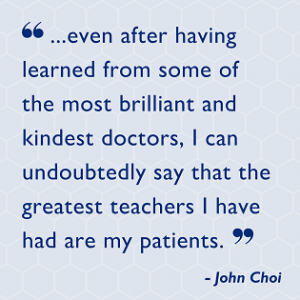Disclaimer: To avoid breaching patient confidentiality per hospital policy, names and circumstances have been altered. However, the spirit of the interaction with patients was preserved as best as possible.
As I sit here typing at 3:23 a.m., my sandpaper eyes can just barely focus on a keystroke before looking yearningly at my bed. But, in just under an hour, I will be heading over to the hospital to begin another full day on my medicine rotation, with chart reviews and studying to follow late into the night. This is the only time I can take a breather to write. But at such an early hour, there is little else that can engage me. So I think of what would make me excited to write. And quite easily, my patients come to mind.
People assume that in medical school, students have incredibly capable teachers and mentors who expertly guide our learning. They’re right; the image of a practiced doctor passing down her knowledge to impressionable young physicians in training is an accurate one. We have excellent faculty who not only meticulously teach us medicine but also serve as exemplars in their everyday interactions with patients. Yet, even after having learned from some of the most brilliant and kindest doctors, I can undoubtedly say that the greatest teachers I have had are my patients.
With every patient, textbook material becomes augmented by people who are able to share their real life story with you. Their presenting symptoms, responses, and physical exam findings become your new foundation for understanding conditions. Also, the gravitas of learning changes; when you miss a question on a written test, there is little consequence. When you miss a diagnosis in a patient with a serious condition, you can never forget. And even beyond the medical facts, you learn how to pause and listen. You learn to look beyond a constellation of symptoms and see patients as people who might be scared — especially the ones who seem so bitter and angry. Every patient tells a story, and our duty as physicians is to respect that fact, and listen.
 Mr. E is a 44-year-old gentleman who comes in about twice a year for extremely painful episodes from his sickle cell disease. A vaso-occlusive crisis, or VOC, occurs when abnormally shaped red blood cells block small vessels and prevent oxygen from being delivered to tissues. In textbooks, the pain from VOC is described as intense and debilitating. In room 409, it is Mr. E curled up in a fetal position — grimacing even as I enter the room.
Mr. E is a 44-year-old gentleman who comes in about twice a year for extremely painful episodes from his sickle cell disease. A vaso-occlusive crisis, or VOC, occurs when abnormally shaped red blood cells block small vessels and prevent oxygen from being delivered to tissues. In textbooks, the pain from VOC is described as intense and debilitating. In room 409, it is Mr. E curled up in a fetal position — grimacing even as I enter the room.
This is a man who is in more pain than I’ve ever felt in my life, and he somehow has the capacity to warmly wave me closer. When I introduce myself, he turns his grimace into more of a smile. In short breaths, he manages to tell a detailed story of his journey with sickle cell disease. As he speaks, the presentation of VOC becomes firmly affixed in my mind. I also learn that he has a big dog named Beethoven. Afterwards, during the physical exam portion when I listen to his heart, he gives me a toothy smile and explains. “I have an S4 heart sound. Doctors say it’s rare.”
He is right. Until that point, I had never heard something like that outside of an audio recording or simulation. He tells me to let other physicians or medical students know, in case they are interested in hearing it, and grins again when I take another listen. When I thank him for his time, he tells me that he is always happy to have people learn more about his condition — that maybe someone he sees will one day help cure his disease for others.
It is incredible that patients — sometimes in what is possibly one of the worst situations in their life — could be so magnanimous. There are so many other stories besides Mr. E’s that have left me inspired, sometimes heartbroken, but always thankful for the privilege to learn from them. In our time of training, every patient we see is a part of who we become as doctors; their stories are woven into our practice. But, it seems self-centered to only think of my own journey. That is why, at 4:10 a.m., as I begin what will most likely be another very long day, I take a pause to remember patients like Mr. E and wonder how he and Beethoven are getting along. I remind myself to be thankful and feel privileged to meet such incredible people like Mr. E every day.
And then I am refreshed.
After all, today I will learn yet again from the greatest teachers in medicine.
Related Content
- Countless big and small tragedies occur in the hospital daily. How do residents cope?
- A resident reflects on caring for his patients: Compassion in Eight Stitches.
- The Important Role of Caregivers in Health Care.

Pingback: From Classrooms to Clinics: A Former High School Teacher’s Reflections on Medicine
Comments are closed.